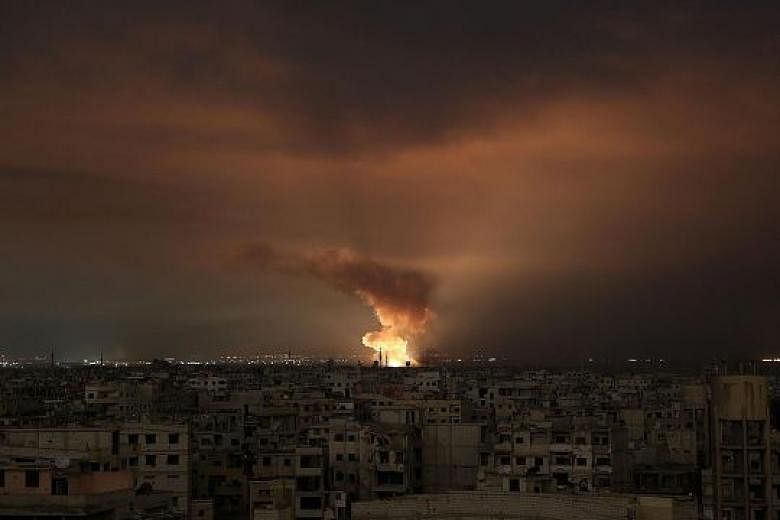DOUMA • New air strikes on the Syrian rebel enclave of Eastern Ghouta took the civilian death toll from seven days of devastating bombardment to more than 500 after the United Nations again delayed a vote on a ceasefire.
More than 120 children are among those killed in the bombing campaign that the regime launched last Sunday in the enclave just outside Damascus, said the Syrian Observatory for Human Rights.
The Britain-based war monitor said at least 29 civilians were killed in yesterday's strikes, including 17 in the main town of Douma.
It has said the strikes are being carried out by Syrian and Russian forces. Moscow, which intervened militarily in support of its Damascus ally in 2015, has denied any direct involvement in the Eastern Ghouta bombardment.
US President Donald Trump on Friday said Russia's recent actions in Syria were a "disgrace".
The UN Security Council had been due to hold a vote on Friday on a resolution calling for a month-long ceasefire to allow aid deliveries and the evacuation of seriously wounded civilians.
But the vote was postponed until 1700 GMT yesterday (1am today, Singapore time) as Western powers bickered with Russia over the wording of the resolution.
Control of Eastern Ghouta is shared between two Islamist factions and Syria's former Al-Qaeda affiliate, and Russia insists there can be no ceasefire with the Islamists or their allies.
Russia has been pressing for a negotiated withdrawal of rebel fighters and their families like the one that saw the government retake full control of Aleppo in December 2016. But all three rebel groups have refused.
World leaders have expressed outrage at the plight of civilians in Eastern Ghouta, which UN chief Antonio Guterres called "hell on earth", but have so far been powerless to halt the bloodshed.
The United Nations says nearly 400,000 people live in Eastern Ghouta, a pocket of satellite towns and farms under government siege since 2013, without enough food or medicine.
Rescuers said the bombing would not let up long enough for them to count the bodies.
"Maybe there are many more," said Mr Siraj Mahmoud, a civil defence spokesman in the suburbs. "We weren't able to count the martyrs yesterday or the day before because the warplanes are touring the skies."
As the bombs rained down, some hitting emergency centres and vehicles, rescuers have struggled to pull people from the rubble, Mr Mahmoud said. "But if we have to go out running on our legs and dig with our hands to rescue the people, we will still be here."
A witness in Douma said he woke up in the early hours yesterday to the sound of jets and bombing nearby. The streets have mostly remained empty.
The rebels have been firing back into Damascus, where a hospital was hit on Friday, state news agency Sana reported.
At least 16 civilians have been killed in the eastern districts of the capital since last Sunday, according to state media.
Russia has vetoed 11 draft resolutions on Syria to block action that targeted its ally. In November, it used its veto to end a UN-led investigation of chemical weapons attacks in Syria.
German Chancellor Angela Merkel and French President Emmanuel Macron wrote to Russian counterpart Vladimir Putin on Friday to ask him to back the ceasefire.
Negotiations have stumbled over a key provision of the draft resolution that specifies when the ceasefire will begin.
Following hours of tough negotiations, an amended draft was circulated that demands a 30-day ceasefire "without delay", while stopping short of specifying the timing.
A previous draft had said the ceasefire would go into force 72 hours after the adoption, but that was dropped from the text in a bid to reach a compromise with Russia.
The draft also specifies that the ceasefire will not apply to operations against the Islamic State in Iraq and Syria terrorist group or Al-Qaeda, along with "individuals, groups, undertakings and entities associated" with the blacklisted terror groups.
AGENCE FRANCE-PRESSE, REUTERS

